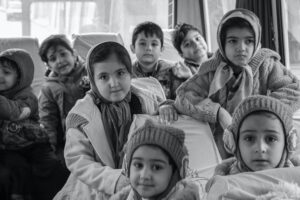Why Women Should Have a Seat at Every Table in Governments Around the World
Statement by the Parliamentary Task Force on Human Trafficking for International Women’s Day on March 8, 2023
According to the United Nations (UN), last year 84 million people were forcibly displaced because of war, violence and human rights abuses. Women and girls often experience the worst of the conflict, being seen not as human beings, but as weapons of war.
Millions of women and children all over the world live in conditions of abuse and slavery, exploited for their labor and their bodies, deprived of their freedom and dignity. Over 70% of human trafficking victims are women and girls. The impact of gender apartheid against women leads to forced marriages, increased rates of domestic violence and unfortunately, sometimes an early death.
It is no coincidence that many countries which threaten the security of the world not only mount unique campaigns of violence against women and girls, but also prioritize the elimination of women from positions of authority and the removal of girls from educational opportunities. In order to improve global security, we must prioritize the opposite with the same intentionality.
Women, Peace and Security
When women are removed from power, treated as underclass citizens and stripped of their basic human rights, such as education, physical safety, due process, and marital choice, economic collapse and instability follow.
One year ago, at the meeting of the Peacebuilding Commission on the report on Peacebuilding and Sustaining Peace, UN Secretary-General António Guterres asserted that we must balance the scales of power and participation equally for women — including as peacebuilders. When there is a lack of significant female representation in positions of government, business, and judicial leadership, there are fewer freedoms for women and fewer laws addressing modern slavery, child brides, and female genital mutilation (FGM).
We must find every possible way to amplify the assets women leaders bring.
When more women are in positions of leadership, everyone benefits – especially during times of crises. Women’s economic participation and empowerment are an essential component to good defense policies, conflict resolution and restoration efforts. Legislative solutions have a better chance of implementation when women have a seat at the peace table, often because of their lived experience expertise.
As a result of the COVID-19 pandemic, there are now fewer women in the workforce in all countries. Many of them had to abandon their professional positions to carry a greater workload at home. The pandemic weakened education access in both developing and wealthy nations; without education, girls lack the knowledge, skills and empowerment to enter and lead in local, national, and global sectors. Additionally, without sustainable economic prospects, trafficking victims are likely to return to their exploitation.
In a world that is divided on various issues, there is agreement among many people on this: human trafficking, gender based violence, and the removal of educational opportunities for girls must end. If we want a more peaceful, secure world, all countries should place a priority on the education of girls and the leadership of women. This is critical not only for humanitarian reasons, but as a primary preventative diplomatic tool to increase the security and stability of the world.
Women bring unique experiences and perspectives to peace negotiations.
As one example, after the fall of the Taliban twenty years ago, Parliamentary Task Force member Fawzia Koofi was at the forefront of Afghan leadership, ensuring that the peace process focused on protecting women’s rights and ensuring their participation in government, civil society, and education. With the Taliban takeover in 2021, MP Koofi fled Afghanistan for her life and the Taliban returned her home country to some of the world’s most severe gender-based discriminatory policies, including banning women from holding almost any jobs and shutting down secondary education for girls. At the UN Human Rights Council meeting on March 1, 2023, several countries echoed analysis Ms. Koofi offered from exile in Western Europe expressing concerns over restrictions on Afghan females and suggesting that these decrees have affected the country’s economy and delivery of humanitarian support.
Ukrainian MP Mariia Ionova, Kosovo MP Vasfije Krasniqi Goodman, Uyghur advocate Rushan Abbas, Hon. Tayna Gould and many other survivors are leading now from lived experience so that the next generation of girls can see a brighter future for themselves.
Conclusion
Currently, the single greatest predictor of a person’s safety or success in much of the world is their gender. This must end.
Today we applaud the many brave women in leadership, especially those who are survivors of human trafficking and abuse, who often do so at the risk of harm to themselves and their families. They are working to end the cycle of gender discrimination, violence and modern slavery.


